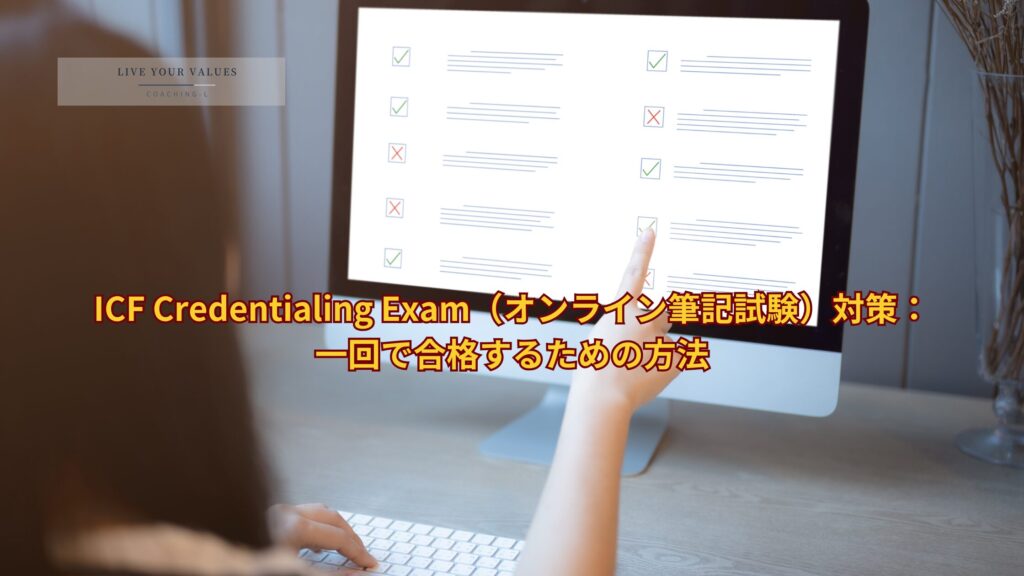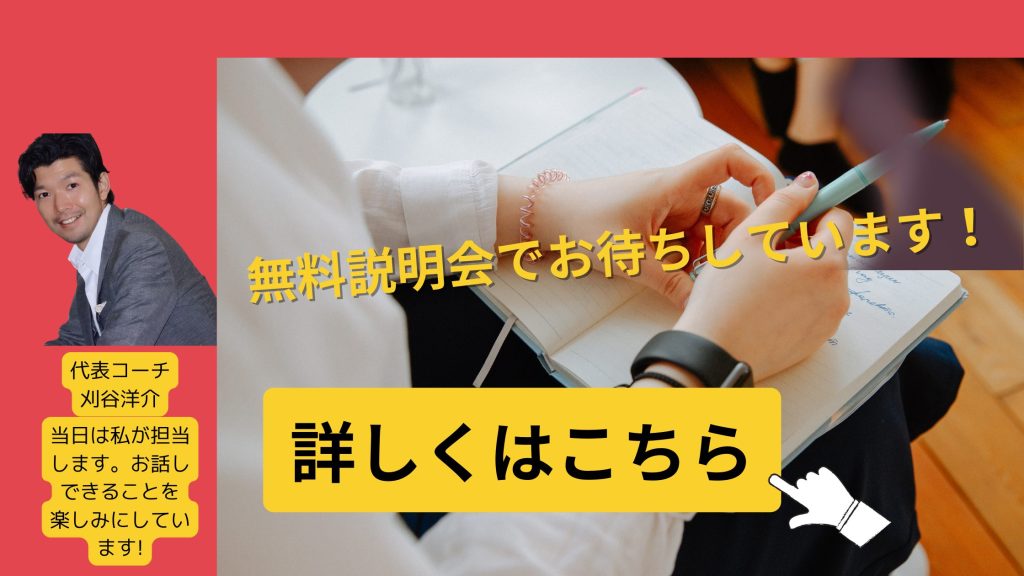この記事は約52分7秒で読むことができます。

ICF Credentialing Exam(オンライン筆記試験)対策: 一回で合格するための方法
先日(2024/11月)新しくなったICFのCredentialing Examを受験してきたので今後受験される方の為にメモを残しておこうと思います。これまでのCKA(Coach Konwledge Assessmentの略:昔の筆記試験)と比べた個人的感想としてはベストアンサーだけでなく、ワーストアンサーを選ぶという問題形式になった分、難易度はやや上がっている感覚です。また、日本語訳の選択肢だと理解しづらい部分があるのである程度英語力がある方の方が有利とも感じます(TOEIC800点以上のレベル)。私が実施した対策の詳細は以下に記載しますので、お役に立てれば嬉しいです。
※私が受験したのは2024/11月です。試験の情報は随時アップデートされる可能性があるのであくまで自己責任で当情報をご利用ください。
試験の際に利用したリンク関連
まずは試験期間中頻繁に確認したリンクを以下に列挙します。
試験の全体像
Solutions Academyの試験案内ページです。受験の際に活用しました。
https://www.solutionsacademy.com/blog/how-to-pass-the-new-icf-credentialing-exam
※53問の過去問(無料)があるのでとても便利。以下がリンクです。
https://docs.google.com/forms/d/e/1FAIpQLSdj_h77dSdmL3KGDSv4fdbHlZELt-1c_lNtKjh0_4n9gMibWg/viewform
※ 問題の質は高いとは言えませんが無料&PassするとCCEがもらえるので活用する価値はあると思います(問題と回答の選択肢の英文が違っていたり、説明が不十分と感じるものもありますが許容範囲です)。個人的には英語のトレーニングにもなるので活用する価値は十分にあります。また、TOEIC800点以上ある方であれば、音読用教材として使用すると英語力も向上し一石二鳥かと思います。
YouTube解説(英語)
ICF筆記試験の詳細説明
ICFのサンプル問題8問
試験の手順(スケジュールアポイントメントなど)
試験までの手順が掲載されています。
システムテストのページ(自宅で受ける場合)
https://www.pearsonvue.com/us/en/icf/onvue.html
テストの注意点(Pearson VUE)
https://www.pearsonvue.com/us/en/test-takers/resources.html
試験対策詳細
ここからはICF Credentialing Examの対策の詳細を説明します。
a) 時間配分
EXAM FORMAT
I. Exam Instructions: 4 minutes
II. Section 1 (39 items): 83 minutes
III. Scheduled Break: 10 minutes
IV. Section 2 (39 items): 83 minutes
Note: For test security purposes, candidates cannot return to section 1 after they begin section 2.
英語受験の場合の試験の流れです。試験申込時に言語選択が可能です。日本語を選ぶと各セクションで15分追加されるので以下となります(試験予約時に言語を選択。ここで日本語を選ぶ。試験では翻訳のボタンをクリックすると英語の原文が見れる)。日本語にすると以下のような時間配分になります。
II. Section 1 (39 items): 98 minutes 2m51s / 問
IV. Section 2 (39 items): 98 minutes 2m51s / 問
※一問あたり3分弱の時間が使えます。120秒経過しても回答できず迷う問題は一旦ピンと来たものを選び、フラグを立てて最後にまとめて回答するという戦略も有効です。日本語を選択すると合計で時間が30分増えるのはありがたい一方、98分✖︎2だと後半集中力が下がる可能性もあるので、慎重になり過ぎて簡単な問題に時間を使い過ぎないといった意識も重要です(3時間以上の試験なので後半にしっかりと体力を温存する)。
b)英語の動詞に注意する
ICFのCredentialing Examにおいて、不正解になりやすいと思われる英語の動詞や表現がいくつかあります。
以下にその例を挙げます:
不正解になりやすいと思われる動詞・表現
- Suggest (提案する): 文脈や内容次第では提案が誘導的であり、不適切になることがあります。
- Tell (言う、伝える): クライアントに何かを直接指示することは、コーチングの原則に反します。
- Advise (助言する): コーチの役割は助言を与えることではないため、この動詞の使用は適切ではありません。
- Should (すべき): クライアントに対して「~すべき」という表現は避けるべきです。
- Help (助ける): コーチはクライアントを直接「助ける」のではなく、クライアント自身の解決力を引き出すことが求められます。
- Interrupt (中断する): クライアントの話を中断することは好ましくありません。
- Judge (判断する): クライアントや状況を判断することは避けるべきです。
- Remind(思い出させる):時に誘導的になりやすいので注意が必要です。
- Repeat(繰り返させる):感情を無視する場合に使用される時があります。
好ましい動詞・表現
- Acknowledge (認める): クライアントの発言や感情を認めることが重要です。
- Explore (探求する): クライアントと共に状況や可能性を探求することが推奨されます。
- Ask (尋ねる): 適切な質問をすることはコーチングの重要なスキルです。
- Support (サポートする): クライアントの自己探求をサポートすることは適切です。
- Invite (促す): クライアントに新しい視点や行動を促すことは効果的です。
これらの動詞や表現の使用は、問題の文脈によって適切かどうかが変わる場合もあります。単に動詞だけで判断するのではなく、全体の状況や意図を考慮して回答を選択することが重要です。しかし、日本語だけで判断しにくいとう状況に遭遇した場合は、これらの動詞に注意しつつ、原文の英語を確認することがお勧めです。
c) 不正解の理由も明確にする
Worstアンサーの絞り込みが難しいのでサンプル問題8問を解く際に、正解だけでなく不正解の理由をしっかりと残す(メモを残して復習の際に見直す)。サンプル問題にはOKやNGの理由がないので必要に応じてChatGPTなどの生成AIのサポートも受けながら理由を導き出しましょう。
d)文章量に注意
分量が多いものが正解になりやすい傾向がある。→修正)試験本番ではあまり分量は変わらなかったと記憶しています。
e)時間が足りなくなった際の対策
時間が足りなくなったら選択肢を見るだけで回答できる場合がある。
f) ベスト&ワーストの傾向
大枠以下のような形で順位づけされている印象です(左に行くほどベスト、右に行くほどワースト)。
認める、尋ねる、誘うなど → モノ・コトへの焦点 → 無責任な励ましや勇気づけ、クライアントの感情の軽視(感情を無視して質問を続けることや誘導的な指示や考え方の押しつけなど)
例:以下、ICFのサンプル問題より
Q5 Worst → モノ・コトへの焦点づけ 感情無視
- Pause for a moment, then ask the client to identify the remaining plans they would like to focus on today.
Q6 Worst → 感情無視
- Repeat the question to the client to give them another opportunity to respond to the coach’s inquiry.
Q7 Worst →無責任な励まし
- Remind the client that they have achieved extremely challenging goals in the past and can meet this big goal, too.
g) ワーストの傾向
コーチからセッションを辞退するよりも、指示的、誘導的、考えの押し付けの方がワーストな傾向あり(これはSolutons Academyの模試の傾向)
h) 解き方の手順
1 .4つの選択肢をさっと読んでこの時点で当たりをつける。
・分量に注目する(分量が多いものが正解になりやすい → と模試の時点では思っていましたが、実際の試験ではそうでもなかったです。)
・この時点でベストは回答できる場合がある。
・ワーストを探す。日本語でも2択までは絞りやすい。
・2択で迷ったら英語を見る。動詞がポジティブなものを使っている場合はワーストではない可能性が高い。
2 . 問題文を読む
選択肢を読み終わったら問題に戻る。
3 . 再度選択肢に戻って回答する
※2と1は逆でも良い(先に問題を読んでも良い。好みの問題。解き方の手順は自分に合うものを練習を通して開発することがオススメ)
ICFサンプル問題(8問)の解説:日本語訳付き
以下にICFのサンプル問題8問と日本語訳、及び解説を記載します。
Question1
A coach is meeting with a prospective client who is growing a new business. The coach and potential client quickly establish an easy connection. The coach is excited about the opportunity to work with the client. As the coach and client are ending their conversation, the prospective client briefly mentions the name of their new business. The coach recognizes the business, as the coach is an investor in a more established competitor business in the same community. What should the coach do?
What is the BEST action?
- Not say anything. Try to keep their role as an investor in a competing business separate from their role as a coach.
- Share that the business name sounds familiar and make a mental note to determine whether it is a competitor business later that evening.
- Share their role as investor in the competitor business only if the potential client follows up to pursue coaching with the coach.
- Share their role as an investor in a competing business and acknowledge the possibility of a conflict of interest with the client.
What is the WORST action?
- Not say anything. Try to keep their role as an investor in a competing business separate from their role as a coach.
- Share that the business name sounds familiar and make a mental note to determine whether it is a competitor business later that evening.
- Share their role as investor in the competitor business only if the potential client follows up to pursue coaching with the coach.
- Share their role as an investor in a competing business and acknowledge the possibility of a conflict of interest with the client.
日本語訳)
コーチが新しいビジネスを展開している見込みクライアントと面談をしています。コーチと見込みクライアントはすぐに親しみやすい関係を築き、コーチはその見込みクライアントと一緒に仕事をする機会に興奮しています。コーチと見込みクライアントが会話を終えようとしているとき、見込みクライアントは新しいビジネスの名前に軽く触れました。コーチはそのビジネスを認識しており、コーチ自身が同じ地域にある、より確立された競合ビジネスに投資していることに気づきました。この場合、コーチはどうすべきでしょうか?
最適な行動はどれですか?
1.何も言わない。競合ビジネスの投資家としての役割を、コーチとしての役割とは別に保とうとする。
2.そのビジネスの名前に聞き覚えがあることを伝え、その晩に競合ビジネスかどうかを確認することを心に留めておく。
3.見込みクライアントがコーチングを依頼してきた場合にのみ、競合ビジネスの投資家であることを共有する。
4.競合ビジネスの投資家であることを共有し、クライアントとの間に利益相反が生じる可能性があることを認める。
最悪の行動はどれですか?
1.何も言わない。競合ビジネスの投資家としての役割を、コーチとしての役割とは別に保とうとする。
2.そのビジネスの名前に聞き覚えがあることを伝え、その晩に競合ビジネスかどうかを確認することを心に留めておく。
3.見込み客がコーチングを依頼してきた場合にのみ、競合ビジネスの投資家であることを共有する。
4.競合ビジネスの投資家であることを共有し、クライアントとの間に利益相反が生じる可能性があることを認める。
Best&Worstの個人的理由:
利益相反については何も言及しないことはNG(2と3は少なくとも何かを伝えている、または伝える意思がある)。事前に見込みクライアントに共有することで利益相反を避ける。倫理的側面からの問題。
Question2
A client struggles with delegating tasks at work to other team members. During the last session, the client shared that an important project they are leading is falling behind schedule. The coach supported the client in identifying strategies to delegate tasks to other team members. At the next session, the client reports back and shares, “In the end, I decided to complete all the tasks myself. That was the only way to get them done on time.” The coach feels disappointment that the client did not follow through on their plans to delegate. What should the coach do?
What is the BEST action?
- Immediately reflect back on their last session with the client and identify what they could have done differently to support the client in following through on their plans.
- Take a breath and acknowledge that the client is responsible for their own choice of whether to follow through with their stated plans or not.
- Set aside their disappointment for now and focus on the current session with the client. Decide to reflect on this situation during an upcoming session with their mentor coach.
- Praise the client for meeting the project deadlines, but ask why the client failed to support their team members’ development.
What is the WORST action?
- Immediately reflect back on their last session with the client and identify what they could have done differently to support the client in following through on their plans.
- Take a breath and acknowledge that the client is responsible for their own choice of whether to follow through with their stated plans or not.
- Set aside their disappointment for now and focus on the current session with the client. Decide to reflect on this situation during an upcoming session with their mentor coach.
- Praise the client for meeting the project deadlines, but ask why the client failed to support their team members’ development.
日本語訳)
クライアントは、仕事で他のチームメンバーにタスクを委任することに苦労しています。前回のセッションで、クライアントはリードしている重要なプロジェクトが予定より遅れていると話していました。コーチは、クライアントが他のチームメンバーにタスクを委任するための戦略を特定するサポートをしました。しかし、次のセッションでクライアントは「結局、自分で全部のタスクをやることにしました。それが期限内に終わらせる唯一の方法でした」とコーチに報告しました。コーチは、クライアントが委任の計画を実行しなかったことに失望を感じています。この場合、コーチはどうすべきでしょうか?
最適な行動はどれですか?
1.すぐに前回のセッションを振り返り、クライアントが計画を実行できるようサポートするために、コーチが異なるアプローチを取るべきだったかどうかを考える。
2.一呼吸おいて、クライアントが計画を実行するかどうかはクライアント自身の選択に責任があることを認める。
3.今は失望感を脇に置き、クライアントとの現在のセッションに集中する。そして、この状況を今後のメンターコーチとのセッションで振り返ることを決める。
4.クライアントがプロジェクトの締め切りを守ったことを称賛しつつ、なぜチームメンバーの成長を支援しなかったのかを尋ねる。
最悪の行動はどれですか?
1.すぐに前回のセッションを振り返り、クライアントが計画を実行できるようサポートするために、コーチが異なるアプローチを取るべきだったかどうかを考える。
2.一呼吸おいて、クライアントが計画を実行するかどうかはクライアント自身の選択に責任があることを認める。
3.今は失望感を脇に置き、クライアントとの現在のセッションに集中する。そして、この状況を今後のメンターコーチとのセッションで振り返ることを決める。
4.クライアントがプロジェクトの締め切りを守ったことを称賛しつつ、なぜチームメンバーの成長を支援しなかったのかを尋ねる。
Best&Worstの個人的理由:
選択の責任はクライアントにあるという原則を遵守している2が正解。1と3はコーチ自身(他責感やクライアントの誘導はない)に視点が当たっているので悪くはない。4はコーチ自身が行動を促進できなかったことや、クライアントの選択を認めるというよりも、クライアントを責めている感覚がある。もしかすると前回のセッションでthe who(クライアント自身)よりもthe what(モノ、コト)に焦点が当たり、戦略決定をコーチ主導で行なった可能性がある。コーチとクライアント関係が対等というよりもメンター的な上下の関係になっているという状態も推察できる。
ChatGPTに相談:
GPTのワーストの理由:この対応は、クライアントの成果を称賛する一方で、すぐに批判的な質問を投げかけています。クライアントが何を感じているか、何を学んだかを探る前に、問題点を指摘するのはコーチとして適切ではありません。このアプローチは、クライアントの行動に対して判断的に見え、クライアントが自分の選択に責任を持って学ぶ機会を妨げる可能性があります。また、コーチング関係においてはクライアントの行動に対する批判的な姿勢は信頼関係を損なう可能性があるため、最も不適切です。
Question3
A client comes to a session appearing stressed. When the coach asks what the client wants to talk about, the client frantically lists a major event they are planning at work, a large family gathering they are organizing, and caring for their aging parents. What should the coach do?
What is the BEST action?
- Ask the client if they need to take a moment before starting the coaching sessions, since they seem stressed.
- Ask the client to share more about their aging parents.
- Acknowledge that the client has shared three significant challenges that they are facing, and ask the client which one they would like to explore first.
- Ask the client to begin with the major event they are planning at work, since they mentioned it first.
What is the WORST action?
- Ask the client if they need to take a moment before starting the coaching sessions, since they seem stressed.
- Ask the client to share more about their aging parents.
- Acknowledge that the client has shared three significant challenges that they are facing, and ask the client which one they would like to explore first.
- Ask the client to begin with the major event they are planning at work, since they mentioned it first.
日本語訳)
クライアントがストレスを抱えている様子でセッションに現れました。コーチが何について話したいか尋ねると、クライアントは慌てて、仕事で計画している大きなイベント、家族の大きな集まりの準備、高齢の両親の世話について話し始めました。この場合、コーチはどうすべきでしょうか?
最適な行動はどれですか?
1.クライアントがストレスを感じているようなので、セッションを始める前に少し時間が必要かどうか尋ねる。
2.クライアントに高齢の両親についてもっと話してもらうよう促す。
3.クライアントが直面している3つの重要な課題を認識し、どれを最初に探求したいか尋ねる。
4.クライアントに、最初に話に挙げた仕事で計画している主要なイベントから始めてもらうように依頼する。
最悪の行動はどれですか?
1.クライアントがストレスを感じているようなので、セッションを始める前に少し時間が必要かどうか尋ねる。
2.クライアントに高齢の両親についてもっと話してもらうよう促す。
3.クライアントが直面している3つの重要な課題を認識し、どれを最初に探求したいか尋ねる。
4.クライアントに、最初に話に挙げた仕事で計画している主要なイベントから始めてもらうように依頼する。
Best&Worstの個人的理由:
Bestにおいてはacknowledgeという単語が正解になるケースが多いという良い例。また、クライアントが選択に責任を持つという観点から3が正解。worstは2か4だが、日本語だと判断しにくい。このタイミングで英語を見る。英語ではsince they mentioned it first.と述べているので、最初に話したことが一番大事なことと思い込んでいる?(コーチの判断が入っている)ので4がworstと推察できる。この問題のように二択まで絞り込んだが正解を導きづらい場合は英語で判断するというテクニックも覚えておくと便利。
ChatGPTに相談:
GPTワーストの理由:この対応は、クライアントが最初に話したことを理由に特定の話題から始めるよう指示しており、クライアントの意向や優先順位を無視している印象を与える可能性があります。クライアントが複数の重要な課題に直面している中で、最初に話題にしたからといって、それが最も重要とは限りません。コーチが話題を選ぶことで、クライアントの自主性が損なわれるリスクがあります。
Question4
A university biomedical researcher is working with a coach to improve their interactions with colleagues. The client is a very analytical thinker and can easily explain detailed data points and complex graphs, but seems reluctant share anything personal with the coach. In previous sessions, the coach encouraged the client to describe how they felt at social events, but the client seems highly uncomfortable, answering only with short, one-word responses. When the client arrives to their session today, the client silently hands the coach a journal. The client has written several, detailed entries over the last week about their experience attending a university luncheon, a faculty party, and a staff development workshop since their last session. While the client says little to the coach in the moment, their entries show deep reflections about the anxiety the client experienced at these events and their desire to overcome social anxiety. What should the coach do?
What is the BEST action?
- Acknowledge the reflection work the client has done, and ask the client if they feel comfortable exploring some of the emotions they described in their journal.
- Ask the client if they would summarize the entries they detailed in their journal for the coach.
- Ask the client to identify some steps they can take to overcome the anxieties they wrote about.
- Ask the client what new awareness they developed about themself through the journaling process.
What is the WORST action?
- Acknowledge the reflection work the client has done, and ask the client if they feel comfortable exploring some of the emotions they described in their journal.
- Ask the client if they would summarize the entries they detailed in their journal for the coach.
- Ask the client to identify some steps they can take to overcome the anxieties they wrote about.
- Ask the client what new awareness they developed about themself through the journaling process.
日本語訳)
大学の生物医学研究者がコーチと一緒に、同僚との交流を改善するためにコーチングに取り組んでいます。クライアントは非常に分析的な思考の持ち主で、詳細なデータや複雑なグラフを簡単に説明できる一方で、コーチに対して個人的なことを話すのに消極的な様子です。以前のセッションでは、コーチがクライアントに社会的なイベントでの感情を説明するよう促しましたが、クライアントは非常に不快に感じているようで、一言だけの短い返答しかしませんでした。本日のセッションで、クライアントは無言でコーチに日記を手渡しました。その日記には、前回のセッション以来、大学の昼食会、教授のパーティー、職員の開発ワークショップに参加した際の経験が詳細に記されています。クライアントはその場ではほとんど何も言いませんが、日記の内容は、これらのイベントで感じた不安や社会的不安を克服したいという深い内省が記されています。この場合、コーチはどうすべきでしょうか?
最適な行動はどれですか?
1.クライアントが行った内省の作業を認め、日記に記載された感情について探求することをクライアントが心地よく感じるかどうか尋ねる。
2.クライアントに、日記に詳細に書かれた内容を要約してもらうようお願いする。
3. クライアントに、書かれた不安を克服するために取るべきステップを特定してもらうよう促す。
4.クライアントに、日記を通して自分について新たに気づいたことがあるかどうか尋ねる。
最悪の行動はどれですか?
1.クライアントが行った内省の作業を認め、日記に記載された感情について探求することをクライアントが心地よく感じるかどうか尋ねる。
2.クライアントに、日記に詳細に書かれた内容を要約してもらうようお願いする。
3. クライアントに、書かれた不安を克服するために取るべきステップを特定してもらうよう促す。
4.クライアントに、日記を通して自分について新たに気づいたことがあるかどうか尋ねる。
Best&Worstの個人的理由:
この問題もQuestion3に続き、正解になりやすい単語のacknowledgeがあるので1がbestであると当たりをつけられる。4はクライアント自身について質問をしているので悪くはないが1ほどは良くない。合わせてworstを導くプロセス。少々判断しにくいが3番がいきなりモノ・コトに焦点付しているという当たりはつけられる。英語に目を移すと、全て動詞がaskなの動詞からは判断できない。問題文へと移る。当クライアントはパーソナルな感情表現が苦手なのでクライアント自身へ焦点を当てることが望ましい(the who)。3はthe stepsという単語があるように、クライアント自身が何者なのか?何を感じているのかよりもいきなりthe what(もの、こと)に焦点づけしており、当クライアントに対しては望ましくない。
Question5
A coach recently began working with a client to help them plan for retirement. The client is a well-respected teacher who has taught for 30 years at a local elementary school. The client consistently arrives highly prepared and organized for coaching sessions, routinely reporting progress between sessions and identifying specific topics to focus on during coaching conversations. The client shares they are looking forward to retirement, but they discuss their retirement plans in a very matter-of-fact way. During the current session, the client shares that they have two weeks left before their retirement begins. They would like to focus on a few remaining plans they need to make. Suddenly, the client begins to cry and says, “I’ve spent half my life at this school! I adore my students and my colleagues are my best friends. I can’t imagine what my life is going to be like when I no longer walk through the front doors of the school each morning!” What should the coach do?
What is the BEST action?
- Pause for a moment, then ask the client to identify the remaining plans they would like to focus on today.
- Ask the client if they are sure they want to retire.
- Acknowledge that retirement is a significant life transition and that emotional responses are normal.
- Pause, then acknowledge the emotional impacts the transition seems to be having on the client, and ask if they would like to spend some time with those feelings.
What is the WORST action?
- Pause for a moment, then ask the client to identify the remaining plans they would like to focus on today.
- Ask the client if they are sure they want to retire.
- Acknowledge that retirement is a significant life transition and that emotional responses are normal.
- Pause, then acknowledge the emotional impacts the transition seems to be having on the client, and ask if they would like to spend some time with those feelings.
日本語訳)
コーチは最近、クライアントが退職計画を立てるのをサポートするためにコーチングを始めました。クライアントは地元の小学校で30年間教えてきた、非常に尊敬されている教師です。クライアントは常にコーチングセッションに準備万端で臨み、セッションの間に進捗を報告し、コーチングセッションで焦点を当てる具体的なトピックを特定しています。クライアントは退職を楽しみにしていると話していますが、退職計画については非常に淡々とした調子で話しています。今回のセッションでは、退職まであと2週間だと共有し、いくつか残っている計画に焦点を当てたいと話します。ところが、突然クライアントは泣き始め、「私はこの学校で人生の半分を過ごしてきました!私は生徒が大好きで、同僚は私の親友です。毎朝この学校の玄関を通らなくなる生活がどんなものか、想像もつきません!」と言いました。この場合、コーチはどうすべきでしょうか?
最適な行動はどれですか?
1.少し間を置いてから、今日焦点を当てたい残りの計画を特定してもらうようクライアントに尋ねる。
2.退職を本当に希望しているかどうか、クライアントに確認する。
3.退職は大きな人生の転機であり、感情的な反応が起こるのは普通のことだと認める。
4.少し間を置いてから、転機がクライアントに与える感情的な影響を認め、それについて時間をかけて話し合いたいかどうか尋ねる。
最悪の行動はどれですか?
1.少し間を置いてから、今日焦点を当てたい残りの計画を特定してもらうようクライアントに尋ねる。
2.退職を本当に希望しているかどうか、クライアントに確認する。
3.退職は大きな人生の転機であり、感情的な反応が起こるのは普通のことだと認める。
4.少し間を置いてから、転機がクライアントに与える感情的な影響を認め、それについて時間をかけて話し合いたいかどうか尋ねる。
Best&Worstの個人的理由:
クライアントへの配慮や、クライアントの選択を尊重して進め方を尋ねていると言う点で4番がベスト。動詞の観点から見ると、この問題も正解になりやすいacknowledgeがあるので4がbestであると当たりをつけられる(3もワーストではないと当たりをつけられる)。worstを導くプロセスとしては、クライアントの感情への焦点づけをせず、行動にフォーカスし過ぎている1と判断できる。クライアントの今この瞬間の感情を軽視した行動への過度なフォーカスはワーストになりやすい。
Question6
A client is working with a coach to support them during an important career transition. The client currently holds a demanding role as Chief Operating Officer of a company, while also raising two young children and serving as primary caretaker for their aging parents, who live with the client. The client recently received job offers from three different companies, each requiring the client and their family to relocate. The client comes to the session excited about the new job opportunities and hopes to gain clarity through the session on which offer to choose. The client starts by discussing the things they are looking for in a new job, energetically listing opportunities for growth, challenging responsibilities, a talented team to lead, and the potential for travel. When the coach asks what the client’s children and aging parents may need in a new community, the client’s excited smile disappears and they are suddenly quiet. What should the coach do?
What is the BEST action?
- Repeat the question to the client to give them another opportunity to respond to the coach’s inquiry.
- Ask the client if they are okay to proceed with the session, or if they need a break.
- Pause for a moment, then share with the client that they noticed a change in the client’s energy. Ask if the client would like to explore what they are feeling in this moment.
- Support the client in weighing the offers they have received by inviting the client to explore each of the characteristics they listed for a new job.
What is the WORST action?
- Repeat the question to the client to give them another opportunity to respond to the coach’s inquiry.
- Ask the client if they are okay to proceed with the session, or if they need a break.
- Pause for a moment, then share with the client that they noticed a change in the client’s energy. Ask if the client would like to explore what they are feeling in this moment.
- Support the client in weighing the offers they have received by inviting the client to explore each of the characteristics they listed for a new job.
日本語訳)
クライアントは、重要なキャリアの転機においてサポートを受けるため、コーチと共に課題に取り組んでいます。クライアントは現在、会社の最高執行責任者(COO)という厳しい役割を担いながら、2人の幼い子供を育て、高齢の両親の主要な介護者としても務めています。両親はクライアントと一緒に暮らしています。最近、クライアントは3つの異なる会社から仕事のオファーを受けており、どのオファーもクライアントとその家族が引っ越しをする必要があります。クライアントはセッションに興奮しながら臨み、新しい仕事の機会について話し合い、どのオファーを選ぶべきかを明確にしたいと考えています。クライアントは、成長の機会、挑戦的な責任、才能のあるチームを率いること、そして出張や移動の可能性など、新しい仕事に求めることを生き生きとリストアップし始めます。コーチが「新しいコミュニティーで子供たちや高齢の両親が必要とするものは何でしょうか?」と尋ねると、クライアントの興奮した笑顔は消え、突然静かになりました。この場合、コーチはどうすべきでしょうか?
最適な行動はどれですか?
1.質問を繰り返して、クライアントにもう一度答える機会を与える。
2.クライアントがセッションを続ける準備ができているか、休憩が必要かどうかを尋ねる。
3.少し間を置いてから、クライアントのエネルギーの変化に気づいたことを共有し、今この瞬間に感じていることを探求したいかどうかを尋ねる。
4.クライアントがリストアップした新しい仕事に求める特性を一つずつ探求することで、オファーを検討するようサポートする。
最悪の行動はどれですか?
1.質問を繰り返して、クライアントにもう一度答える機会を与える。
2.クライアントがセッションを続ける準備ができているか、休憩が必要かどうかを尋ねる。
3.少し間を置いてから、クライアントのエネルギーの変化に気づいたことを共有し、今この瞬間
に感じていることを探求したいかどうかを尋ねる。
4.クライアントがリストアップした新しい仕事に求める特性を一つずつ探求することで、オファーを検討するようサポートする。
Best&Worstの個人的理由:
コーチの態度(感情への焦点づけ)、文量などから見ても3が明らかにベスト。1はクライアントの感情に配慮せず、質問をすることが目的(自分の質問に固執)になっている。2はクライアントのエネルギーレベルに配慮してはいるが、休憩が必要かどうかは疑問。4はthe who(クライアント自身)よりもthe what(モノ、コト)に焦点が当たり過ぎておりこの状況ではベストとは言えない。
ChatGPTに相談:
ChatGPTワーストの理由:この対応は、クライアントのエネルギーの変化に気づかず、再度質問を繰り返すだけであり、クライアントが感じた感情や変化を無視している印象を与えます。クライアントが感じている困難や不安に対するサポートを欠き、クライアントの内面の気づきを引き出す機会を逃してしまうため、最も不適切です。
Question7
A coach is working with a client who is an experienced marathon runner writing a book on training for endurance races. This is a long-held dream for the client. The coach notices that the client often uses running metaphors when talking about their challenges and progress in their writing. The client is typically upbeat and energetic, but they arrive at today’s session appearing tired and discouraged. They share with the coach that they have recently “hit a wall” in writing, with three chapters remaining. When they sit down to write, the client says they can barely come up with anything, and nothing that is worth publishing. The client says they are afraid they won’t be able to complete the book on time and that all of their work toward this goal will be lost. What should the coach do?
What is the BEST action?
- Ask the client if they would like to explore their fear of not finishing the book.
- Remind the client that they have achieved extremely challenging goals in the past and can meet this big goal, too.
- Ask the client if there was a time when they were running a marathon and felt like they couldn’t finish. Invite the client to share how they handled that challenge in the race.
- Support the client in identifying strategies to help them move forward in writing the remaining chapters of the book.
What is the WORST action?
- Ask the client if they would like to explore their fear of not finishing the book.
- Remind the client that they have achieved extremely challenging goals in the past and can meet this big goal, too.
- Ask the client if there was a time when they were running a marathon and felt like they couldn’t finish. Invite the client to share how they handled that challenge in the race.
- Support the client in identifying strategies to help them move forward in writing the remaining chapters of the book.
日本語訳)
コーチは、耐久レースのトレーニングに関する本を書いている経験豊富なマラソンランナーのクライアントとコーチングに取り組んでいます。出版はクライアントが長年抱いてきた夢です。コーチは、クライアントが自身の課題や進捗を話す際に、よくランニングに関する比喩を使うことに気づいています。通常、クライアントは明るくエネルギッシュですが、今日のセッションには疲れた様子で、落ち込んだ表情で現れました。クライアントは、残り3章のところで「壁にぶつかった」と感じていることをコーチに伝えます。書こうとすると、ほとんど何も思いつかず、出版に値するものが書けないと感じています。クライアントは、本を時間内に完成させることができないのではないか、これまでの努力が無駄になってしまうのではないかという恐れを抱いていると言います。この場合、コーチはどうすべきでしょうか?
最適な行動はどれですか?
1.クライアントが本を完成させられないという恐れについて探求したいかどうか尋ねる。
2.クライアントが過去に非常に困難な目標を達成してきたことを思い出させ、今回も大きな目標を達成できると伝える。
3.クライアントがマラソンを走っている際に、完走できないと感じた時があったかどうかを尋ね、そのレースでどのようにその課題に対処したかを共有してもらう。
4.クライアントが本の残りの章を進めるための戦略を特定するサポートをする。
最悪の行動はどれですか?
1.クライアントが本を完成させられないという恐れについて探求したいかどうか尋ねる。
2.クライアントが過去に非常に困難な目標を達成してきたことを思い出させ、今回も大きな目標を達成できると伝える。
3.クライアントがマラソンを走っている際に、完走できないと感じた時があったかどうかを尋ね、そのレースでどのようにその課題に対処したかを共有してもらう。
4.クライアントが本の残りの章を進めるための戦略を特定するサポートをする。
Best&Worstの個人的理由:
クライアントはランニングを比喩で使うと問題に書いてあり、クライアントの特徴を捉えテーラーメイド(個別対応)し、比喩を使うことで気づきを促進しようとしている点で3がベスト。1も悪くはないが3ほどではない。2と4で迷う。4はthe what(モノ、コト)にフォーカスし過ぎているが、2は内的な探索を無視して励ましているだけ。ICFの判断は2がワースト。クライアントが落ち込んでいる時の無責任な勇気づけや方向づけは「もの、こと」へのフォーカスよりも不適切な対応になると見受けられる。
Question8
A coach has worked for one year with a client. The client has been identified by their supervisor as a potential leader in the organization based on their high-quality work, good relations with peers, and innovative ideas for future projects. However, the client rarely speaks up in meetings with senior leaders and when they do, they often downplay or diminish their ideas. The client’s supervisor recommended coaching to improve the client’s executive presence, with the ultimate goal of developing as a leader in the organization. At the start of coaching, the client was often self-critical. However, the client has made tremendous progress in recent months. During their closing session, the coach notices that the client has a confident, easy smile. When the coach shares their observation with the client, the client responds by saying, “I feel different, empowered, ready to take on new challenges.” The client adds, “And I was just nominated by the CEO to be part of a leadership development program for emerging leaders in our company!” What should the coach do?
What is the BEST action?
- Acknowledge the client’s growth in confidence over the past year, and invite the client to share how they plan to celebrate their selection for the leadership development program.
- Invite the client to identify challenges they would like to take on next.
- Ask the client what they may need to maintain their new confidence.
- Suggest to the client that they extend their coaching engagement to work toward a new goal of being promoted to a leadership role.
What is the WORST action?
- Acknowledge the client’s growth in confidence over the past year, and invite the client to share how they plan to celebrate their selection for the leadership development program.
- Invite the client to identify challenges they would like to take on next.
- Ask the client what they may need to maintain their new confidence.
- Suggest to the client that they extend their coaching engagement to work toward a new goal of being promoted to a leadership role.
日本語訳)
コーチは、クライアントと1年間にわたりコーチングに取り組んできました。クライアントは、質の高い仕事、同僚との良好な関係、将来のプロジェクトに関する革新的なアイデアに基づいて、上司から組織内のリーダー候補として認識されています。しかし、クライアントは上級幹部との会議でほとんど発言せず、発言する際も自分のアイデアを控えめに表現しがちです。クライアントの上司は、組織のリーダーとして成長するために経営層にふさわしい振る舞いを改善する目的でコーチングを勧めました。コーチングの開始時、クライアントはしばしば自己批判的でした。しかし、ここ数カ月でクライアントは大きな進歩を遂げています。最終セッションで、コーチはクライアントに自信に満ちた穏やかな笑顔が見られることに気づき、その観察を伝えると、クライアントは「自分が変わったと感じます。力を得て、新たな挑戦に臨む準備が整いました」と答えました。さらに「CEOから、当社の次世代リーダー向けのリーダーシップ開発プログラムに推薦されました!」と話してくれました。この場合、コーチはどうすべきでしょうか?
最適な行動はどれですか?
1.過去1年間での自信の成長を認め、リーダーシップ開発プログラムに選ばれたことをどのように祝うつもりかクライアントに尋ねる。
2.次に取り組みたい挑戦を特定するようクライアントに促す。
3.新しい自信を維持するために必要なことが何か、クライアントに尋ねる。
4.昇進という新たな目標に向けて、コーチングを延長することをクライアントに提案する。
最悪の行動はどれですか?
1.過去1年間での自信の成長を認め、リーダーシップ開発プログラムに選ばれたことをどのように祝うつもりかクライアントに尋ねる。
2.次に取り組みたい挑戦を特定するようクライアントに促す。
3.新しい自信を維持するために必要なことが何か、クライアントに尋ねる。
4.昇進という新たな目標に向けて、コーチングを延長することをクライアントに提案する。
Best&Worstの個人的理由:
4が明らかにワースト。セッションはクライアントの時間であり、コーチの時間ではない。特に、頼まれてもいないのにコーチが勝手に目標を特定し、セッション中に営業をするのはNG。ベストはacknowledgeという単語、文章の量、内容的にも1が正解。2はthe what(モノ、コト)に焦点が当たり過ぎで、3は2よりは良いが、クライアントが「今この瞬間」の感情を軽視している点で1には及ばない。
※この問題は、動詞に注目するとワーストを選びやすい。1ackknowledge 2 invite 3 ask 4 sugggestなのでこれだけでもベストとワーストの当たりをつけられる。コーチングではセッション中に行動をsuggest(提案)はする時はあるが、頼まれてもいないのに営業提案はしない。
試験全体の注意点など
試験でおきたトラブルや対処法を以下にまとめます。
個人的には会場で受けるのがオススメ!
私は自宅で受けようと思ったのですが、以下の様なトラブルがありました。
・その日に限って隣の家で工事。プロクター(試験監督)から「なんの音?」と聞かれ「隣の家でパイプ交換のような工事をしている」と説明したら何とか許可はもらえたが少し動揺した。
・試験スタート後にPCがフリーズ。システムテストでは問題がなかったので驚いた。結局一問も解けずに試験終了。
→後日Pearson VUEのカスタマーサポートに確認をしたら、テスト当日もシステムテストで使ったソフトをダウンロードするので、システムテストで使用したソフトは念の為削除しておいた方が良いとのことだった(二つのソフトが干渉することはないようだが念のため)。
・家だと何が起こるか分からないので確実に受けたいという人は会場がオススメです。自宅と会場までの距離にもよりますが、事前の準備(英文での説明読み込みやシステムテストなど)を考えると、会場で受けるのもトータルの準備はあまり変わらない気がします。
・自宅試験の際のプロクター(試験監督)とのやりとりは全て英語です。
もし自宅受験でシステムトラブルが起きたら?
以下に問い合わせ先にリンクを貼っておきます。私はPearson VUEに問い合わせたら無料で再受験の権利をもらえました。
Pearson VUE:日本語ホームページ
https://www.pearsonvue.com/jp/ja/test-takers.html
Pearson VUE:カスタマーサービス電話番号
https://www.pearsonvue.com/jp/ja/test-takers/customer-service.html
再受験付与までの流れ
・Pearson VUEのカスタマーサービスに電話したところ、システムトラブルのため、無償での再受験の資格発行ができるようにICFに働きかけてくださいとのアドバイスをもらいました(2営業日以内にICFから回答があると思うのでお待ちくださいとのこと)。
・Pearson Japanからトラブル3日目にメールがあり「ケース番号」を教えてもらいこの番号をベースにICFに問い合わせるよう連絡をもらう。
・約1週間後にICFからメールがあり無料で再受験の権利が付与された。
試験当日(会場受験)の注意点
・IDが二つ必要なので注意(僕はパスポートと免許を念のため持っていった。その認識はなかったので危なかった。。。笑)
まとめ
私はオンラインでの受験がシステムトラブルで受験できなかったので、会場で受験。一回目でPassできました。
個人的感想をまとめると
・難易度はCKAより高め
・英語ができる方が有利
・試験は会場受験がお勧め
・試験対策としては以下を実施
実施した試験対策
①ICFのCore Competencyの読み込み
②ICFの倫理規定の読み込み
③通ったスクールの教材をざっとレビュー
④ICFのサンプル質問8問を5回転ほど(正解と不正解の理由をメモして反復)&自分なりの解法を確立。
⑤53問の模擬試験を3回転ほど
準備時間、対策全部入れて1ヶ月ほど、1日30分〜60分程度を要したと思います。
試験期間中にまとめたメモをそのまま活用してブログにしたので少し読みにくい部分もあるかと思いますがご了承ください。ICFの筆記試験は対策や過去問などの情報が少ないので不安な方も多いと思いホームページブログに掲載することを決めました(個人的にはICF公認の問題集や試験結果の開示をしてもらえると復習ができるのでありがたいと感じます。Passしたのは嬉しいですが、ミスした問題の結果が分からず、復習ができずコーチングを実施するのはどうかとも感じます。合格者の人数が限られている足切りの試験ではないと思うのでこのあたりの改善がされるとより試験の信頼性が高まるかなと感じます)。冒頭にも記載した通り、試験情報は随時変更される可能性があるので、必ずICFの情報を確認してください。また、当情報は自己責任でのご利用をお願いいたします。それでは、皆様が試験を通して、一つでのも多くの学びがあることを願っております。
※試験に対する個別の問い合わせには対応しておりませんのでご了承ください。
個別無料説明会(オンライン)について

ライフコーチングを受けたい方はオンライン無料説明会へお申し込みください。

説明会は代表の刈谷(@Yosuke_Kariya)が担当します!お待ちしています!
コーチング有料体験について
実際にコーチングを体験してみたい方向けに、有料のコーチング体験も用意しております。ご興味のある方は以下をクリックください。
-

コーチング体験(有料)| ライフコーチング |【東京・コーチ歴13年・実績3000時間】
この記事は約4分3秒で読むことができます。 目次 / Contents コーチング体験(有料)のお申し込みページへようこそ!対象クライアント様代表コーチ刈谷洋介のご紹介体験セッションの流れコーチング有 …

